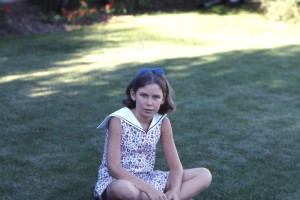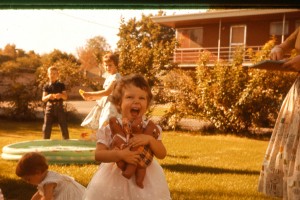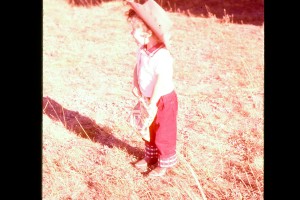“There was a point where my dentist was asking me if I’d finished it. Literally. My dentist!”
LISA
My dad did a PhD in physics at the University of Arizona so there was a strong culture of “you’re going to go to college” when I was growing up. I don’t ever remember thinking anything different; I’m the oldest child of four, and when I was in high school I was a really good student and I earned a scholarship. I went to BYU—that was the Mormon thing to do.
I imagined I’d be a public schoolteacher. So I decided I’d be a teaching major in English and pursued that, and did student teaching at a junior high in Provo. Those kids were jaded, and that was a hellish experience, and I decided I didn’t want to teach junior high English. I quit pursuing a secondary teaching credential and thought, “Well, I’m going to finish that master’s degree and then we’ll see.” And I did finish, and that was a happy day. Not so long after that I decided I would apply to the PhD program at the U.
But what I’m leaving out of all of this is my marital and reproductive history, because it is simultaneous. When I started my doctoral program at the U in 1985, I had three kids and I really did think it was the end. I mean, for a Mormon, three kids is not an excess of children but it’s respectable! Anyway, I had another kid, and then I had another kid. I got to the point where I had finished my coursework and I took my prelims when I was eight and a half months pregnant with my last child. And then I passed my oral exams. And then I had that baby.
Then, you know, you embark in this great wasteland of writing a dissertation. The thing I was writing about was James Merrill, who basically wrote an epic-length poem called The Changing Light at Sandover. In this poem, the guy, he and his partner—which I guess is more or less based on the truth—had a series of sessions at the Ouija board in which they felt they had conjured up a guy from a past world who wanted to talk to them. And out of that an entire cosmology came. So it’s this crazy poem. First of all, it was written in the late 20th century—nobody has visions of guys coming from the afterlife to tell you about how the universe is constructed and who God is. Especially not a gay man with massive crazy super-refined aesthetic sensibilities. It was a completely wacky poem. But I come from a religious tradition, and so that was what was interesting to me.
Things got complicated in my personal life. My marriage got difficult and then I got a job here at the community college in 1992, which was good. Not too long after that my husband and I got separated. I spent a couple of summers really working hard on the dissertation and I got pretty close to a full draft. But when I got back to it, which was when I had my sabbatical in 2001, I had remarried and I had a job and five kids and I thought, “You know what? I don’t love this dissertation anymore. I’m going to rewrite it!” And by rewrite it, I mean, “I’m going to write a whole new thing—on the death of poetry or something!” Someone should have put their arm around my shoulder and said, “It doesn’t matter whether you like this dissertation or not. It’s a whole draft!” But I embarked in this entire new research project. And by the end of that sabbatical, I had a substantial amount of new work, but I did not have a finished draft. And then I went back to work. Periodically, I would think, “Okay, I’m going to finish this. I’m going to finish this” and I’d get in touch with someone. My dissertation advisor had long since left the university, by the way.
I took my next sabbatical in 2008. People who knew me would be like, “So are you going to finish your dissertation?” Listen, there was a point where my dentist was asking me if I’d finished it. Literally. My dentist! And I guess I just thought, “I should finish it, for heaven’s sake. I should.” I started my doctoral work in 1985; a motivated person would have been done in five or six years. But I couldn’t stand the prospect of going back and saying to those people: “What do I have to do to finish my dissertation? What do I have to do to finish this PhD?’” I just thought, “The moment’s passed. I hate the position it puts me in of still being essentially a trainee, an apprentice. I have a career!” It seemed humiliating.
And I knew there were other things I wanted to learn and try. That second sabbatical was when I wanted to learn to make video essays. I thought, “Do I really want to spend the time I can take away from my job to learn and do a project or work on that tired old thing?” At a certain point I just said, “I’m quitting.” I didn’t say it to anybody but myself. And then I said it to my husband. But I felt a lot better. I left it, that’s it. It also allowed me to claim that whole experience as something else—instead of as a failure, which it can still sometimes feel like. But I learned a lot from engaging with that long poem for so long. And thinking about it. And I learned a whole bunch just from the process of taking courses at the university and being involved with those people. That experience was really valuable to me, but the argument in the dissertation is no longer particularly fresh. It doesn’t have any life for me anymore. Still, sometimes I think, “What I’m going to do is go back to the writing and try to excavate a couple of articles out of it.” And I don’t know. Maybe I still will.
♦


